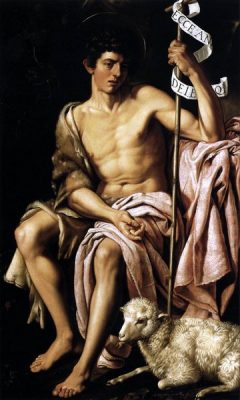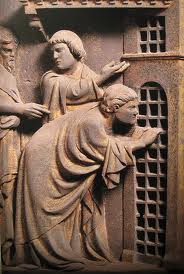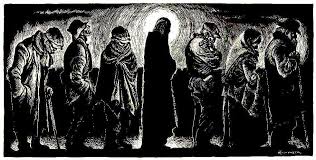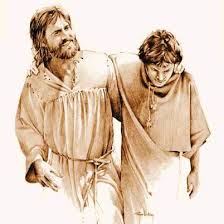
(Gaudete Sunday!)

Gospel Text : Matthew 11:2-11
vs.2 John in his prison had heard what Christ was doing and he sent his disciples to ask him,
vs.3 “Are you the one who is to come, or have we got to wait for someone else?”
vs.4 Jesus answered,
“Go back and tell John what you hear and see;
vs.5 the blind see again,
and the lame walk,
lepers are cleansed,
and the deaf hear,
and the dead are raised to life
and the Good News is proclaimed to the poor;
vs.6 and happy is the man who does not lose faith in me.”
vs.7 As the messengers were leaving, Jesus began to talk to the people about John:
“What did you go out into the wilderness to see?
A reed swaying in the breeze? No?
vs.8 Then what did you go out to see? A man wearing fine clothes?
Oh no, those who wear fine clothes are to be found in palaces.
vs.9 Then what did you go out for? To see a prophet?
Yes, I tell you, and much more than a prophet; he is the one of whom scripture says:
vs.10 ‘Look I am going to send my messenger before you;
he will prepare your way before you.’
vs.11 I tell you solemnly, of all the children born of women, a greater than John the Baptist has never been seen; yet the least in the kingdom of heaven is greater than he is.”
************************************************
We have four sets of homily notes to choose from.
Please scroll down the page to read them.
Michel DeVerteuil : A Holy Ghost priest, fmr Director of the Centre of Biblical Renewal, Trinidad W.I.
Thomas O’Loughlin: Professor of Historical Theology, University of Nottingham.
John Littleton: Director of the Priory Institute Distant Learning, Tallaght, Dublin 24
Donal Neary SJ: Editor of The Sacred Heart Messenger
*******************************************************
Michel de Verteuil
Lectio Divina The Year of Matthew
www.columba.ie
General comments
The passage is clearly in two sections:
Verses 2 to 6: The meeting between John’s disciples and Jesus.
Verses 7 to 11: Jesus speaks of John.
 You can read verses 2 to 5 as a journey into a deeper faith which John the Baptist made, letting your meditation guide you to interpret this journey from your own experience. What was John’s prison? Why did he send disciples? What was the purpose of his question?
You can read verses 2 to 5 as a journey into a deeper faith which John the Baptist made, letting your meditation guide you to interpret this journey from your own experience. What was John’s prison? Why did he send disciples? What was the purpose of his question?
You can, on the other hand, concentrate on Jesus, looking at his ministry for example, or, if you prefer, looking at how he responded to the question of John’s disciples. You might like to enter deeply into the final saying in verse 6, identifying with the ‘blessedness’ spoken of by Jesus.
If you are meditating on verses 7 to 10, enter into the movement of the passage, identifying with the two options that Jesus puts forward – the ‘reed swaying in the breeze’ and the ‘man in fine clothes’ – before identifying with who John the Baptist really was. The passage invites us to make that journey before arriving there.
Verse 11 is a paradox and you must identify with both aspects of it, until you experience these things which seemed at first contradictory can, in fact, come together in harmony. As always, personal experience must be your guide.
Scriptural prayers
“Our philosophy of history constitutes a sort of intellectual prison. We carry on as if we have been reduced to impotence and are completely incapable of any initiative on our own behalf.” …Lloyd Best
Lord, we are in a prison.
 We are all the time looking for the one who is to come and save us,
We are all the time looking for the one who is to come and save us,
and if this one does not satisfy us, we say that we must look for someone else.
Send us leaders like Jesus who will make us hear and see the great things you are doing among us:
– people who were lame now standing up and doing things for themselves;
– others finding new energy to live creatively;
– the poor discovering the good news that they are not poor at all.
Leaders like this will teach us the blessedness of not losing faith in ourselves.
Lord, we often read in the Bible of your great power,
how you have laid your axe to the roots of the trees
and any tree which fails to produce good fruit will be cut down and thrown on the fire;
and how the winnowing fan is in your hand
and you will soon clear your threshing floor of chaff.
Yet, like John the Baptist, we find ourselves still imprisoned by the injustice of the world.
You are teaching us the blessed way of Jesus which is to conquer evil by doing good.
Lord, we thank you that in many parts of the world
the church is not concerned with answering abstract questions
such as ‘Are you the one who is to come?’
but, like Jesus, is inviting people to hear and see how the blind are seeing again, the lame walk, lepers are cleansed, the deaf hear,
the dead are raised to life and the Good News is proclaimed to the poor.
“It is no business whatever of the Christian churches to be keeping people passive and morally well-behaved while all the major questions of their lives are settled by others.” …Dr John Vincent, President of the Methodist Conference of the United Kingdom
Lo rd, we pray that when people come to the church,
rd, we pray that when people come to the church,
they may not find us following meekly the dictates of the powerful,
like reeds swaying in the breeze, nor concerned with fine garments like people who live in palaces.
May they find a prophet and more than a prophet,
an institution that will show up the false values of our society
and so prepare the way for your chosen ones to carry out your work in the world.
“One day our grandchildren will visit each other and wonder what all the pain and bloodshed were for. And perhaps they will be proud of us, that we foresaw the happy future which they will take for granted.” ….An Israeli woman writing to an Arab friend.
Lord, help us, like John the Baptist, to play our part in history,
content in knowing that what we have worked hard and suffered to achieve,
that the least significant of the next generation will enjoy as a matter of course.
“Looking to the past has much to offer; living in it nothing at all.” …John Harriot
Lord, the church today is very different from how it was some years ago:
– the various forms of lay ministry;
– collaboration with other churches and with people of other faiths;
– the contribution of every culture;
– the Bible opened to all.
Like Jesus remembering John the Baptist,
we remember with gratitude great people of the past
who could not accept these things.
None of us was as great as them,
but we must rejoice in all that even the least of us knows today.
****************************************************
3. Thomas O’Loughlin,
Liturgical Resources for Advent and Christmas
www.columba.ie
Introduction to the Celebration
 In these weeks before Christmas our reflection and prayer as a community focus on the various ways that the Lord is near to us: he is the One who is continually coming into our world with his good news of liberation and joy; we are the people who welcome him and become his hands, and mouth, and feet. So we can now reflect on the joyfulness that is ours because we are in Christ’s presences — he is near to us; but we must regret the times when our actions have been far from him.
In these weeks before Christmas our reflection and prayer as a community focus on the various ways that the Lord is near to us: he is the One who is continually coming into our world with his good news of liberation and joy; we are the people who welcome him and become his hands, and mouth, and feet. So we can now reflect on the joyfulness that is ours because we are in Christ’s presences — he is near to us; but we must regret the times when our actions have been far from him.
Homily notes
1. The time of wishing ‘Happy Christmas’ is already here:
the adverts are full of holly and ‘Christmas Cheer‘;
the diary is full of Christmas related events;
and ‘getting ready‘ is an urgent state of being.
So what if you are one of those people who find the whole thing a drag?
and Christmas a time of stress and cannot wait for the spring light? 
Or think it is all overplayed?
It probably means that you suffer in silence as it appears to be ‘not the done thing’ to be ‘down’ on Christmas’. Alternatively, one can just feel guilty and stressed that one is ‘not feeling as one ought to feel’. Then there is the question of the family, the in-laws, or the tensions of all the extra people in the house. Preachers can often so idealise ‘the family’, that they ignore the real pain of many of their hearers and this, in effect, alienates them from the gospel’s message.
2. The simple fact is that many people hate Christmas, wish it would pass quickly, dismiss it as only important if there are children to be entertained, or a time of loneliness. This is a significant group in any community; they are not to be likened to Scrooge in Dickens’ A Christmas Carol; and their feelings should find expression at some point in the liturgy. Preaching is about helping people grow in wisdom and holiness, not simply the broadcasting of ‘our message‘ over and over in the manner of religion channels on television. So how does one engage with the people for whom the whole Christmas thing is painful?
3. Step 1: Acknowledge that that these attitudes exist and are worthy of being taken seriously. No one should feel that they could be dismissed as ‘party poopers‘ or for ‘not getting into the spirit of the thing’. Christmas is a time of heightened emotions, complex memories, and a series of stress inducing deadlines due to the various tasks that have to be done before such and such a moment.
Step 2: Even if Christmas is a pain for you, human beings celebrate collective memories of all sorts of things and this is a basic element in every religion and culture. Such special times are as old as humanity, as the stones of Newgrange and Stonehenge bear mute witness. You may find it ‘ a pain’ but without such common memories we would not be bound together as a society. Moreover, without ‘high days‘ the passing of time would have a grim monotony. We are creatures that need special times and ordinary time. Here is part of the genius of the gospel with its cycle of festivals rooted simultaneously in the cycles of nature (Christmas is linked to midwinter, the original pasch was a spring-time agricultural feast) and the revelation of God’s love in the incarnation and paschal mystery. We may not be ‘in tune‘ with Christmas merriment, but without an annual cycle we would be diminished as human beings and as Christians. It is worth recalling the proverb’ A change is as good as a rest’: Christmas marks a change from the ordinary – even if it is only because it annoys us so – and any change is an opportunity to take stock of our lives and ways of life. If Christmas really does ‘turn you off,‘ then it can be a call to self-reflection and growth in self-knowledge.
 Step 3. During the 1960s, when the calendar was being reformed, there were many publications suggesting that either Christmas should be abandoned as distracting from the annual Christian feast (Easter) or arguing that since the December date had been so overlaid with cultural celebrations that the Christian feast was apparently an ‘add-on’ and these writers urged that the feast be moved to another date during the year. Neither suggestion was acted upon -luckily both suggestions were so daft that they did not stand a chance of getting through – but it does raise an interesting question for us as people who are celebrating Christmas as a feast and not simply as the time of the winter party. Let us imagine that
Step 3. During the 1960s, when the calendar was being reformed, there were many publications suggesting that either Christmas should be abandoned as distracting from the annual Christian feast (Easter) or arguing that since the December date had been so overlaid with cultural celebrations that the Christian feast was apparently an ‘add-on’ and these writers urged that the feast be moved to another date during the year. Neither suggestion was acted upon -luckily both suggestions were so daft that they did not stand a chance of getting through – but it does raise an interesting question for us as people who are celebrating Christmas as a feast and not simply as the time of the winter party. Let us imagine that  the feast of the nativity were moved to, for example, 1 September; what would we be celebrating? This is a useful question as it can help us separate out the Christian recollection from the mistletoe-bedecked merriment; and so can help people who do not like Christmas to separate the feast which is a key part of memory as believers from the merriment and the stress. So what really would we celebrate on 1 September if in a future revision of the calendar the nativity of the Christ were so moved? You should point out, by the way, that such a change is fully within the competence of the Church – for we sometimes think that there is Christmas existing in itself quite apart from the Christmas communities that celebrate it: a classic case of confusing effect with cause.
the feast of the nativity were moved to, for example, 1 September; what would we be celebrating? This is a useful question as it can help us separate out the Christian recollection from the mistletoe-bedecked merriment; and so can help people who do not like Christmas to separate the feast which is a key part of memory as believers from the merriment and the stress. So what really would we celebrate on 1 September if in a future revision of the calendar the nativity of the Christ were so moved? You should point out, by the way, that such a change is fully within the competence of the Church – for we sometimes think that there is Christmas existing in itself quite apart from the Christmas communities that celebrate it: a classic case of confusing effect with cause.
4. That final question, if we moved Christmas Day from 25 December to 1 September, may help those who dislike Christmas to hear their experience reflected in the homily, but it is useful question to pose to every member of the gathering to help them clarify her/his mind on what we as Christians are recalling!
****************************************
John Litteton
Journeying through the Year of Matthew
www.Columba.ie
Reflection
During Advent we are a people in waiting. Advent is a hope- filled time, a time of expectation and anticipation But, most of all, it is a time of waiting: waiting for the Messiah to arrive in our lives and in the world. His first arrival, when he was born in a stable, may be commemorated at Christmas. Or his second arrival, when he will come as King and Judge on the Last day, may be anticipated. Or his daily coming into our lives, in prayer, people and activities, may be acknowledged.
Waiting is part of all our lives. However, if the time we spend waiting is to be useful, our waiting must be purposeful. This means that we must wait properly for people, events and outcomes, always using the time effectively and efficiently to prepare for them. If we do not, the time spent waiting is wasted. And, regrettably, there is so much wasted time in our lives.
An essential quality of purposeful or effective waiting is patience. For example, if we become impatient while waiting for retirement from work or for the school term to finish, we simply waste that time. Impatience leads to frustration, anxiety, anger, cynicism and, ultimately, unhappiness Unhappiness prevents us from doing anything constructive to sustain and prepare us while we wait. Our waiting is in vain and, inevitably, we are not ready when the time finally comes.
 Similarly, if we do not use these days of Advent properly by waiting patiently for Christ to come into our lives at Christmas — especially by recognising and welcoming him in the sacraments and in other people then we will not be ready to meet him when he comes. Frustration, anxiety, anger and cynicism are alien to the hope-filled spirit of Advent.
Similarly, if we do not use these days of Advent properly by waiting patiently for Christ to come into our lives at Christmas — especially by recognising and welcoming him in the sacraments and in other people then we will not be ready to meet him when he comes. Frustration, anxiety, anger and cynicism are alien to the hope-filled spirit of Advent.
We need to be patient as we wait for the Lord’s arrival. When John the Baptist was in prison, having heard about Jesus’ ministry, he sent his disciples to ask Jesus: ‘Are you the one who is to come, or have we got to wait for somebody else?’ (Mt 11:3). John was the last in a long line of prophets who had been waiting for generations for the Messiah to come.
 John and his disciples were privileged but not all of them realised that the Messiah had arrived even when Jesus sent this clear message to John: ‘Go back and tell John what you hear and see; the blind see again, and the lame walk, lepers are cleansed, and the deaf hear, and the dead are raised to life and the Good News is proclaimed to the poor.’ (Mt 11:4-5).
John and his disciples were privileged but not all of them realised that the Messiah had arrived even when Jesus sent this clear message to John: ‘Go back and tell John what you hear and see; the blind see again, and the lame walk, lepers are cleansed, and the deaf hear, and the dead are raised to life and the Good News is proclaimed to the poor.’ (Mt 11:4-5).
The message of Advent, then, is that we should wait patiently for the Lord to come into our lives. Our waiting can be a time of enrichment during which some positive change occurs.
Even as we await Jesus’ arrival at Christmas, he is present to us in word and sacrament. But he is also present to us in the words and gestures of other people, if only we would become more astute in recognising him. It is only when we are patient that we avoid the frustration prevalent in the lives of many people that, in turn, prevents them from being truly open to the presence and influence of Christ at Christmas.
For meditation
I tell you solemnly, of all the children born of women,
a greater than John the Baptist has never been seen;
yet the least in the kingdom of heaven is greater than he is. ….(Mt 11:11)
********************************
Donal Neary SJ
Gospel Reflections for Sundays of Year A: Matthew
www.messenger.ie/bookshop/
Good news of God

John the Baptist was a man of passionate commitment to what he believed in. He strongly believed in the coming of the Christ. This man of faith was being tested in that Jesus was a different type of Christ or Messiah from what he expected. He often wondered who the Messiah would be.
John was a man with a lot of conviction and truth. He preached what he believed. He practised what he taught.
But he seemed to miss the point sometimes. He seemed to miss that Jesus would be found, not in preaching only but in helping others.
John preached repentance for sin; Jesus preached the coming of the kingdom.
The blind would see, and the lame would walk – these were to be signs of the coming of the ‘One to come’.
 Pope Francis says:
Pope Francis says:
‘There is no prayer in which Jesus does not inspire us to do something/ Our faith in Jesus is seen in strong action. The poor are helped at our pre-Christmas collections. We might ask not what we might get for Christmas, but how our Christmas might help others. We might ask that Christmas will be happy for others because of us – happy in body, with enough food for every family, happy in mind that we know the truth of God’s coming into the world, and happy in forgiveness, as that is one of God’s biggest gifts.
Lord, let me believe that your life is good news and
share this good news in word and deed with all whom I meet
*********************************************